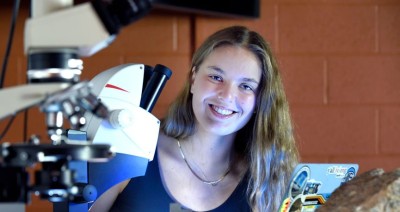Studying the Resilience of Carbon-Accumulating Seagrass: Olivia Key’s SURF Story
10/24/2023
Written by By Andy Little ‘24 and published by the College of Arts and Sciences.
Olivia Key ‘25 is a geological sciences major with a geographic information sciences minor from Greensboro, North Carolina. This summer, she conducted research at the Institute of Marine Sciences on the resilience of seagrass beds in North Carolina, focusing on their importance as carbon sinks and thus their value in reducing carbon dioxide emissions in North Carolina in relation to climate change. Her research was sponsored through the Summer Undergraduate Research Fellowship (SURF) program in the Office for Undergraduate Research.
Q: Can you describe your research in a soundbite?
A: There has been a lot of buzz recently in the research community that suggests that seagrass has the power to be a significant carbon sequesterer. This could be important for North Carolina carbon budgets because North Carolina has the most seagrass area of any state on the U.S. East Coast, but the lack of information about North Carolina’s seagrass carbon sequestration makes it hard to quantify. My research focuses on the resilience of these seagrass beds to storm and burial events, which move a significant amount of sand, often burying seagrass as they do. Understanding whether or not these beds and their stored carbon can survive storm events is important for understanding whether loss of seagrass cover will lead to loss of all the carbon accumulated in the seagrass bed. This, in turn, is important because of seagrass’ potentially valuable role in climate change and reducing net carbon emissions.
Q: What inspired you to pursue this particular research project?
A: In spring 2023, I took a sedimentology and stratigraphy class with Dr. Antonio Rodriguez. I really loved learning about how sedimentological processes influence our world and how if you look closely enough, you can put together a story about the history of those deposits. Calls were put out to apply for SURF funding, so I approached Dr. Rodriguez about applying. One of the things that interests me most about geology is its applications for modern-day problems, and Dr. Rodriguez mentioned Ph.D. student Yasamin Sharifi’s project that involved looking at seagrass as a blue carbon sink through a sedimentological lens. This piqued my interest, and my project stemmed from that.
Q: How did the Summer Undergraduate Research Fellowship support your research?
A: My research required me to live and work in Morehead City at UNC’s Institute of Marine Sciences, which would not have been possible without the funding from the Summer Undergraduate Research Fellowship. The grant completely funded my living expenses for 11 weeks this past summer.
Q: What advice would you give to a student interested in applying for a SURF?
A: The most important piece of advice I could give would be to find an adviser who will be present and willing to answer questions. This was my first time conducting research on my own project and my first time working in sedimentology. I had taken a class on the subject, but that alone could not have prepared me for everything that comes with actually doing research in the field. My adviser was helpful and supportive with all of this, and that made a huge difference.
The second piece of advice I would give is to have a good idea of what your day-to-day life will look like because if you don’t enjoy your day-to-day, 11 weeks can feel like a long time. I never pictured myself as someone who would enjoy working a 9 to 5 job, but I really enjoyed it this summer. It was such an amazing feeling to be excited to come into work every day!
Q: What has it been like to conduct your own research for the first time?
A: Conducting my own research for the first time has honestly been kind of life-changing. Going into this summer I was unsure of how I felt about research: the only research experience I’d had was working on a small part of someone else’s project that I didn’t fully understand. This summer I was finally able to work on a project that was all my own where I fully understood the mechanisms and reasoning behind the research. It was very validating to get confirmation that I am on the path that I want to be on and I can see myself doing this in the future. I think my undergraduate research experiences are the most valuable things I’ve gone through at Carolina, and I would encourage all other undergraduate students to seek out research opportunities, too.
Q: It’s a Saturday afternoon, and you’re taking a break from your academic work. Where would we find you?
A: The idealized answer to this question is outside on a run, biking around Chapel Hill with friends, enjoying the local music and arts scene or maybe taking a trip to the beach or the mountains. The more realistic version of this answer (at least from this past weekend) is sitting on my couch watching The Great British Baking Show or Gilmore Girls with my roommates.
UNC-Chapel Hill celebrates University Research Week Oct. 23-27 with the theme, “A Climate of Change at Carolina.” Stay tuned to the College website all week for stories like Key’s as we share news about Carolina student and faculty researchers.